The Inhumans seek vengeance on the Kree and the king delivers his Black Eulogy in this second issue of the series. From the creative team of Donny Cates, Ariel Olivetti and Jordie Belleaire. Recap and review following the jump.
The Royal Family had been lured away and in their absence a new faction of The Kree Empire laid siege to the kingdom of Arctillan. Led by the mysterious and powerful being known as Vox, The Kree raised the city and slaughtered its populace, leaving behind the ominous ultimatum: ‘join or die.’
Over three thousand Inhumans perished in the attack, among them Triton, Naja, Sterlion, Maximus, and Lockjaw. Having returned too late, all the Royals can do is gaze upon the ruins and mourn the dead.
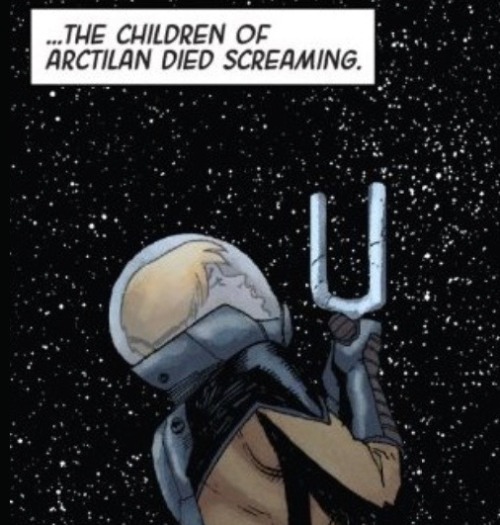
All this weighs heavily on Black Bolt. He had been their king and their protector. They must have called out his name, prayed for him to save them and he failed them all. He has lost his kingdom, his people, his brother and his best friend.
Black Bolt tries to grapple with the despair and not give into blind fury. The Kree had delivered their ultimatum and now it is on him to provide a response.
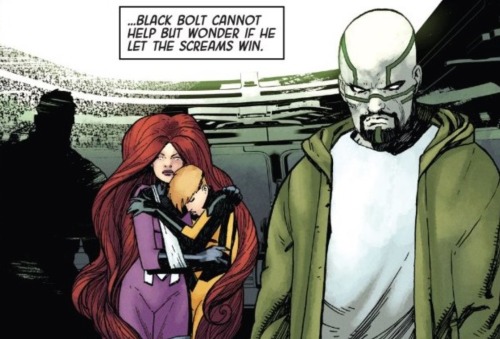
The narrative forwards to the planet Hala, a burnt cinder of a world that had once been the seat of power for an empire that spawned the cosmos. It was destroyed by the Black Vortex yet now a new military installation has been erected.

Karnak enters the facility as the emissary of his people, stating that he has come to negotiate a surrender. He is met by an unnamed Kree general flanked by a pair of Accusers. Karnak dispenses with the pleasantries in his usual manner and asked what has become of Ronan, the former steward of Hala.
The General replies that Ronan has been eliminated. He further explains that he and his people were explorers sent by the empire to furthest reaches of the galaxy so to reconnoiter potential areas of expansion. Their mission extended for centuries, whole generations lived and died while they were on their quest. And all the while what drove them on was their faith in Empire, their belief that they were serving a cause greater than themselves. Finally they returned only to discover that Hala had been destroyed and the Empire scattered.
Karnak has little in the way of sympathy to offer.
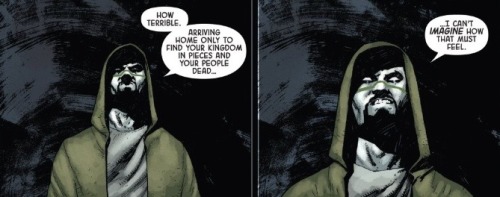
Still, it was not the Inhumans who had destroyed Hala, why have they become the target of this mournful rage? The Inhumans are a free people disassociated from the Empire.
The General counters that The Inhumans are not free; they are slaves, tools and weapons created by the Empire. He demands that they can either return as dutiful soldiers or be crushed as deserters.
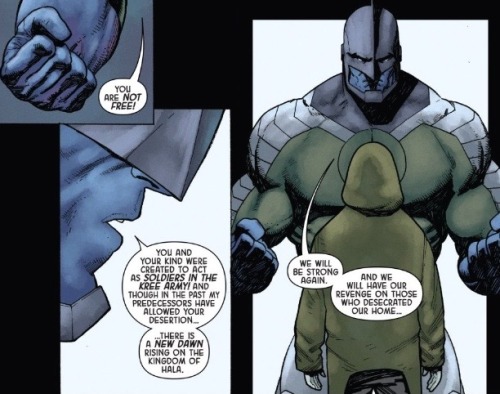
It is here that Karnak chooses to correct the general on his misassumption. He had not come to offer the terms of The Inhumans’ surrender, but rather accept the surrender of The Kree.
The general is disappointed but not surprised. He calls in his war chief, the mysterious Vox. No further information on who this creature is or where he comes from is offered. Only that he is a formidable adversary, speaks in a bizarre third person plural, and appears to possess many of the same powers as the Inhuman royals.
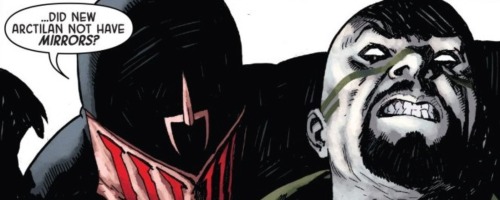
Vox is able to counter Karnak’s precision strikes and stabs him in the abdomen. It is a painful but not lethal wound and Karnak grimaces through it and states that his king has arrived to offer his statement.
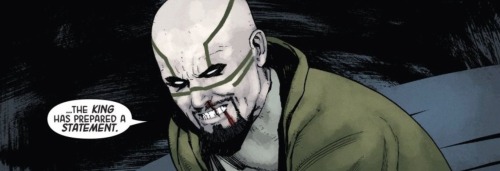
Black Bolt touches down on Hala and wastes no time in beginning his assault. He allows himself to fully unleash his sonic powers, delivering a ‘Black Eulogy’ by reciting the name of every Inhuman who had perished in the Kree’s attack. Each name resonates with a seismic blast that tears through the Kree army with merciless destruction.

There is one name Black Bolt cannot bring himself to recite; it would just be wrong to turn this name into a weapon of death. The name itself is left unrevealed. It may be that of Black Bolt’s brother, Maximus, but my guess is that it is Lockjaw… the only member of the Royal Family who was truly pure and innocent.
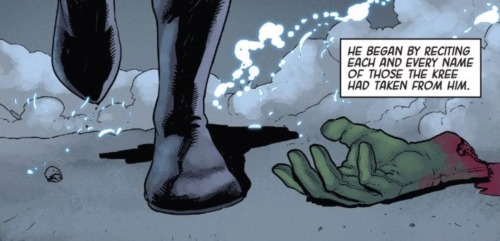
The Kree had demanded fielty or death and Black Bolt chose death. The army is left decimated yet Vox is left unfazed. He stands behind Karnak, holding he blade to his throat, and wonders allowed why Karnak had been sent if Black Bolt had resigned himself to attack. Karnak answers that it was his idea, he had to be there to see it for himself… to sate his own need for vengeance.
It is here that Black Bolt falters in his resolve. In the past, Black Bolt might not have flinched at the idea of sacrificing Karnak to achieve his end. But this is a different Black Bolt, very much changed by his experiences detailed in his solo series. He uses sign language to offer himself in exchange for Karnak’s life.
And Vox accepts the offer, teleporting from behind Karnak to behind Black Bolt. And then proceeds to slit his throat!
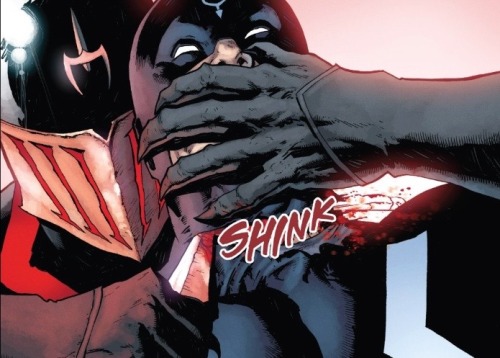
It’s a gory and ghastly scene and Black Bolt falls to his knees, dying. And it is here that the issue ends with the promise of continuation in the next installment…
As was the case with the first issue, the story is quite well written, well illustrated, beautifully colored and an absolute bummer to read. Both Black Bolt and Karnak get some neat moments being badasses, yet they also both get their lunch fully handed to them by Vox. The ‘Black Eulogy’ is an extremely cool and badass take-down of the Kree army… yet ends up a little less ‘black eulogy’ and more ‘red wedding’ with Black Bolt getting his jugular cut Catelyn Stark style…
This new faction of the Kree Army is interesting enough while not especially compelling. It’s probably for the best that Black Bolt had so decimated them. Their fanatical tribalism, their being the forgotten soldiers who wish to return to the glory days of the Empire strikes me as similar to the push in American right-wing politics to go back to how things were. Sort of a ‘Make Hala Great Again’ type of deal.
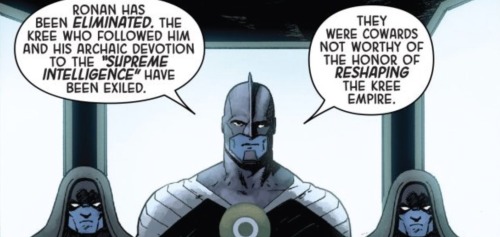
Vox remains a cypher shrouded in mystery. I’m intrigued by the way in which he possesses multiple types of powers and speaks in a third person plural, calling himself ‘we.’ I wonder if this is a hint of his origins.
In the past, The Kree created the Supreme Intelligence by taking their most accomplished scientists and thinkers and melding them into a singular being with a hive mind. Might Vox have been created in a similar fashion?
He also reminds me of The Trikon. The Trikon was a being Maximus had created by taking three Alpha Primitives and exposing them to the Terrigen Mist.
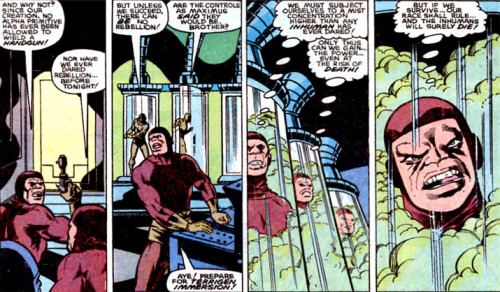
Somehow this caused the three Alphas’ to merge into a singular being endowed with incredible powers. Could Vox be in some way related to this Triklon? I guess we’ll have to wait and see.
Cates does a good job of offering Karnak that same dry, nihilistic vibe that Warren Ellis had in the Karnak solo series. Ellis’ work on Karnak promoted him from a character I had a passing interest in to a new favorite. I’ll certainly be looking forward to seeing more of Cates writing Karnak (both in this series as well as the recently revealed Marvel Knights project).
Black Bolt appears to die and the general alludes to Ronan being eliminated, yet both appear on the cover art to the next issue. Cover art can often be misleading, but I wonder if this may suggest Black Bolt’s being able to survive what looks to be a mortal wound. Black Bolt does possess the power for molecular manipulation… this could conceivable be employed to treat his severed jugular (although this might just be my sense of denial grasping at straws.
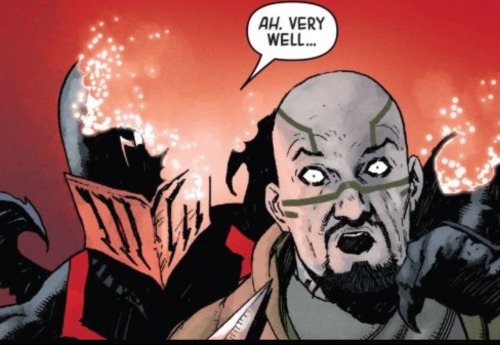
On the subject of grasping at straws, Vox’s teleportation powers has the same visual effect as his the sonic blast that appeared to kill Maximus and Lockjaw in the first issue. Maybe Vox’s vocal powers are not so much a dissolving-beam, but rather a teleporting-beam. Again, grasping at straws… but my fingers are crossed nonetheless.
Clearly my being an Inhumans super-fan makes it difficult to assess the issue in an objective fashion. A part of me sees it as a pretty cool story, the sort of cosmic comic action I’ve always been a huge fan of. If this is to be Black Bolt’s death then it it’s a fairly good death… one in which he gets to show off his coolness as well as self-sacrifice.
At the same time, another part of me is pretty much like ‘fuck this shit, stop killing off all my favorite characters!’ I sort of feel like one of those angry Star Wars fans who are unable to appreciate the new movies not based on the actual merits of the movies but rather because they are mad that their beloved characters had died or didn’t act the way they wanted them to.
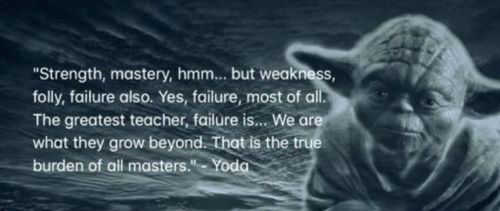
Nostalgia and an ardent maintaining of the status quo has been a major obstacle in super hero comics for quite a while now. There has to be change in order to keep the stories fresh, dynamic and fun. And yet many of the readers and creators of the stories grew up with these characters and there can be a huge resistance to any kind of change. It’s easy to want things to stay the same, for the characters to never change, never die or pass on their mantles to a new generation.
The Inhumans are not as popular as characters like Spider-Man, Iron Man or the X-Men. As such, there might be more of an opportunity to bring about real, lasting change and new dynamic development.
Iron Man actually becoming Riri Williams, Peter Parker retiring and letting Miles Morales take his place, the older X-men stepping down and affording the younger, newer Mutants to take the spotlight just isn’t going to happen… not any time soon. There are too many fans instant on returning to the original status quo.
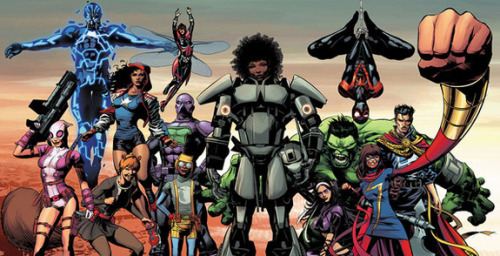
And a return to that status quo is exactly what happened. The former editor in chief at Marvel was sacked, a new editor brought on board and in short order everything snapped back… Thor became Odinson again with Jane Foster sent back to the sidelines; Wolverine was Logan again with Laura returned back to her moniker of X-23; Tony Stark is back, no longer sharing his title with Riri Williams and Victor Von Doom; likewise Steve Rogers is back and Sam Wilson has reverted back to being The Falcon; even Miles Morales is set to change his superhero name and no longer share the mantle of Spider-Man with Pete.
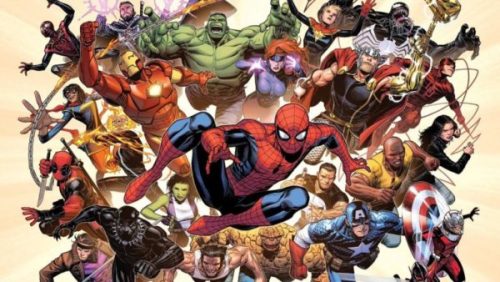
While many fans have lauded this return to the prior status quo, I see it as hugely disappointing. I’m not interested in things being like they were in the 1980s, I already read all those stories and the prospect of seeing it all simply recycled strikes me as pretty boring. Nostalgia loses its allure when it’s actually obtained.
With Death of The Inhumans, I feel myself asked to apply this attitude toward my own beloved favorites. And I must admit it is a tough pill to swallow. Still, convictions only have values when they apply equally to everything. I can’t very well advocate for change for characters like Spider-Man, Thor or The X-Men without also accepting that same change for The Inhumans.
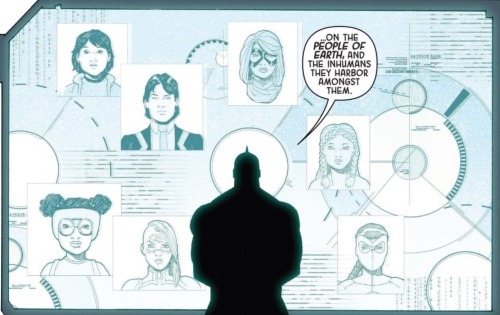
In one scene the Kree General stands before a screen that shows images of the newer and younger Inhumans. This includes young Inhumans with connections to the Royal Family (Luna and Ahura) as well as the newer Inhumans, or ‘NuHumans.’ created by the Terrigen Cloud (Moon Girl, Ms. Marvel, Iso and Synapse). These characters represent the next generation, the heroes destined to take the place of Black Bolt, Medusa, Crystal and the others. And it may be that this changing of the guard is happening a lot sooner than expected.
Popularity for superhero character can be a double edged sword. It keeps the books on the stands but also can mire the characters in a never-changing stasis. The Inhumans are not especially popular… which sucks in that the books (despite their high quality) just barely scrap by. Yet it does leave them unanchored by the burdens of nostalgia. They can change and evolve and in so doing retain that quality, stay fresh and be enjoyable to read. Luna, Ahura, Kamala, Kai, Lunella and the others actually can step up and take the place of Black Bolt, Karnak and the others. Which on the one hand is pretty cool while on the other hand really, really hurts… change is not painless…
In any case, this was a captivating read that stirred up a lot of feelings and hence is recommended but with the caveat that it is a painful ordeal for fellow Inhuman fans. Four out of Five Lockjaws.


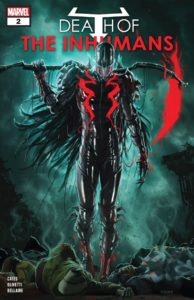
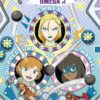 Marvel Rising: Omega review (spoilers)
Marvel Rising: Omega review (spoilers) Black Bolt #2 Review (spoilers)
Black Bolt #2 Review (spoilers)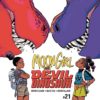 Moon Girl & Devil Dinosaur #21 Review (spoilers)
Moon Girl & Devil Dinosaur #21 Review (spoilers)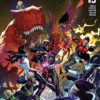 Inhumans Versus X-Men #3 Review (spoilers)
Inhumans Versus X-Men #3 Review (spoilers)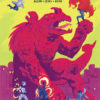 Uncanny Inhumans #1.MU Review (spoilers)
Uncanny Inhumans #1.MU Review (spoilers)